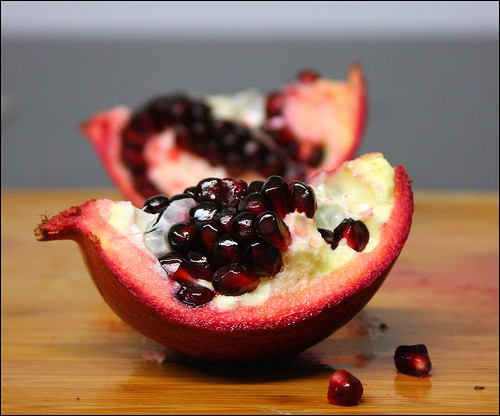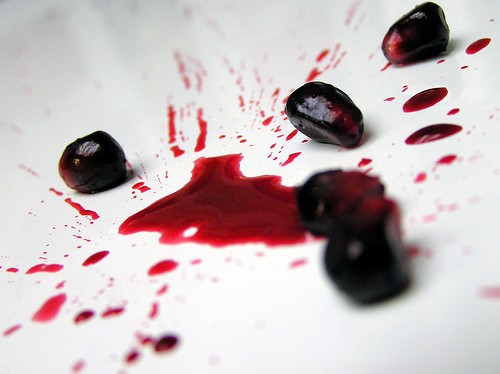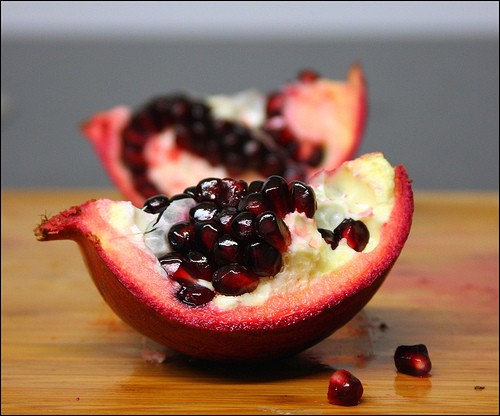In Checkout Line, Lou Bendrick cooks up answers to reader questions about how to green their food choices and other diet-related quandaries.
—————
Dear Checkout Line,
For months now, I can’t seem to walk through my local natural-food market without smacking into a vast display of pomegranates — and I usually put one in my cart. Not that long ago, the fruit with the deep-red seeds would show up in the market in a tiny pile, and just for a short time in October. What gives? Did someone put in a giant monocrop of them somewhere in California? Are they sustainably grown, or do they require lots of pesticides and fertilizers?
Thanks,
Ed with the Red-Stained Lips
Dear Ed,
Hey, Mr. Red-Stained Lips, are you related to Twilight vampire Alice Cullen? I ask because, aside from lip coloration, you must have supernatural powers that tipped you off to the fact that there is indeed a giant monocrop of pomegranates in California!
 Flickr via JOE M500The “someone” who put them there is the rich n’ glammy marketing maven Lynda Resnick, who also owns, among other holdings, the way-out-of-fashion Fiji Water company, and who used to own the Franklin Mint. For the back story on how Resnick plucked the pomegranate from relative obscurity and primed it for superfruit stardom with a savvy ad campaign, read her book Rubies in the Orchard. This book is mostly about marketing, but it got gushy blurbs from a variety of big names including Michael Pollan, Martha Stewart, Arianna Huffington, Michael Milken, Robert F. Kennedy, Jr., Alice Waters, Gloria Steinem, and her Majesty Queen Noor of Jordan (which at least proves she certainly knows how to market herself). I’m sure she meant to ask me for a blurb, too, but my line was busy that day.
Flickr via JOE M500The “someone” who put them there is the rich n’ glammy marketing maven Lynda Resnick, who also owns, among other holdings, the way-out-of-fashion Fiji Water company, and who used to own the Franklin Mint. For the back story on how Resnick plucked the pomegranate from relative obscurity and primed it for superfruit stardom with a savvy ad campaign, read her book Rubies in the Orchard. This book is mostly about marketing, but it got gushy blurbs from a variety of big names including Michael Pollan, Martha Stewart, Arianna Huffington, Michael Milken, Robert F. Kennedy, Jr., Alice Waters, Gloria Steinem, and her Majesty Queen Noor of Jordan (which at least proves she certainly knows how to market herself). I’m sure she meant to ask me for a blurb, too, but my line was busy that day.
Back to pomegranates: The “Wonderful” is the single variety of pomegranate grown for Resnick’s lucrative juice company POM Wonderful. According to its web site, they grow 18,000 acres of capital-w Wonderful pomegranates and supply 90 percent of the American pomegranate market. So, the displays you smacked into (ouch) were likely courtesy of Paramount Farms, the Resnick-owned agribiz operation that supplies POM Wonderful.
Are these pomegranates sustainably grown?
No, but they don’t appear to be hideously evil, either. I doubt any monocrop can ever be truly sustainable, given that it is vulnerable to complete devastation by disease or pests, which may be one of the reasons that Paramount farms conventionally. On the upside, the Wonderful is a hardy variety, pomegranates in general are not a “thirsty” crop (they originally hail from arid Central Asia), and Paramount not only uses high-efficiency irrigation but also claims to be judicious in its application of chemicals.
According to an email from Daniel Portolan in POM Wonderful’s communication department, their pomegranate orchards are equipped with drip irrigation systems through which they can apply precise amounts of a non-aerosol insecticide that is applied once every three years. They also apply fertilizer through these irrigation systems, as needed. They claim to use about a quarter of the nitrogen in their conventional crops than as they do in their organic pomegranate orchard.
Wait — “organic pomegranate orchard”?
Don’t get too excited. According to Portolan, “We currently maintain a small orchard of organic pomegranates with no plans to expand at this time.” (Then again, Resnick devotes an entire chapter of her book on how “green is the new black” when it comes to business, so the pressure is on.)
So how much should you worry about those conventional pomegranates?
 Growing pomegranates can be a messy business.Photo: libraryman via FlickrWell, if you really are related to Alice Cullen, I think you need to ask her to use her powers of precognition because I have no, um, bloody idea. Portolan wasn’t specific about the chemicals that Paramount uses, but according to Pesticide Action Network, some “bad actors” were used on pomegranates in California in 2007. By bad actors, I don’t mean Twilight cast members; rather chemicals that PAN deems highly toxic. Among the eight bad actors used on pomegranates in 2007 was Malathion. I’m not saying that Paramount used this stuff, just that some California pomegranate growers did.
Growing pomegranates can be a messy business.Photo: libraryman via FlickrWell, if you really are related to Alice Cullen, I think you need to ask her to use her powers of precognition because I have no, um, bloody idea. Portolan wasn’t specific about the chemicals that Paramount uses, but according to Pesticide Action Network, some “bad actors” were used on pomegranates in California in 2007. By bad actors, I don’t mean Twilight cast members; rather chemicals that PAN deems highly toxic. Among the eight bad actors used on pomegranates in 2007 was Malathion. I’m not saying that Paramount used this stuff, just that some California pomegranate growers did.
Pomegranates haven’t made the Environmental Working Group’s “Dirty Dozen” or “Clean Fifteen” lists, because the USDA data isn’t available for ranking this particular fruit. “That said, with the skin being so thick, much like a pineapple, I wouldn’t think a pesticide would make it into the part of the fruit people eat if it were applied to its surface,” Alex Formuzis, director of communications for EWG told me by email. “However, if the pesticide is applied to the root it could migrate up, into the inside of the pomegranate.”
Hmmm. Remember those aforementioned drip-irrigation systems that also deliver the pesticides? I’m not sure what to think about that, so I’m going to advise this: If you want to find truly sustainable pomegranates, try to live in a pomegranate-growing state such as California or Arizona, where you might be able to find interesting varieties of pomegranates produced by small growers and sold at farmers markets starting in the late summer or early fall.
You might also consider planting your own. Today, more and more green thumbs are planting interesting pomegranate cultivars thanks to Gregory Levin, an exiled Soviet botanist who often risked his life to collect more than a thousand pomegranate genotypes, and who sent cuttings to the University of California at Davis before his collection was destroyed.
Short of those efforts, look for organic pomegranates at your grocery store next fall. Nobody ever ate a pomegranate fast; enjoy this naturally slow food.
Sorry about the silly vampire theme, Ed, but it’s not easy to add levity to a pomegranate column. And, really, you started it.
Lou Bendrick
(Team Jacob)


